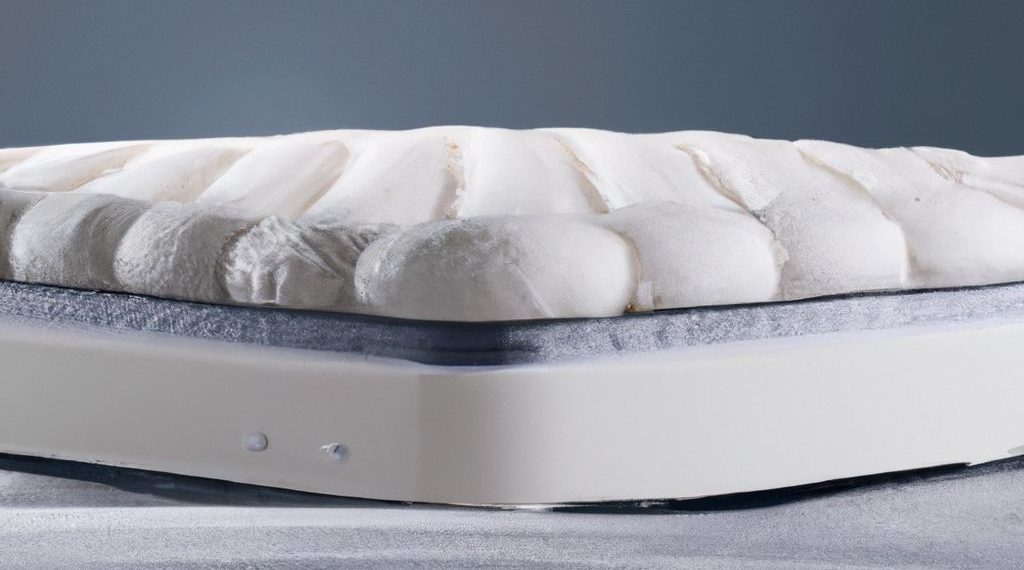Key Takeaways:
- A mattress coil count refers to the number of coils or springs in a mattress. It is an important factor in determining the support, comfort, and durability of a King-size mattress.
- Choosing a good coil count is crucial for a King mattress as it directly affects the level of support and comfort it provides. A higher coil count generally translates to better support and reduced motion transfer.
- When selecting a coil count for a King mattress, factors to consider include the weight of the sleeper and the desired level of firmness. Heavier sleepers may benefit from a higher coil count, while those seeking a firmer feel might opt for a lower coil count.
- It is important to debunk the misconception that more coils always mean better support. Other factors such as coil gauge, which measures the thickness of the coils, also play a significant role in determining the overall support and stability of the mattress.
- For a King-size mattress, a recommended minimum coil count is around 800 coils. However, the ideal coil count range may vary depending on the weight of the sleeper. Lighter sleepers may find comfort in a range of 800-1000 coils, while heavier individuals may benefit from a range of 1000-1500 coils.
- In conclusion, choosing the right coil count is essential for a King mattress as it directly impacts support, comfort, and long-term durability. Considering factors such as weight, desired firmness, and understanding the significance of coil gauge will help in making an informed decision.
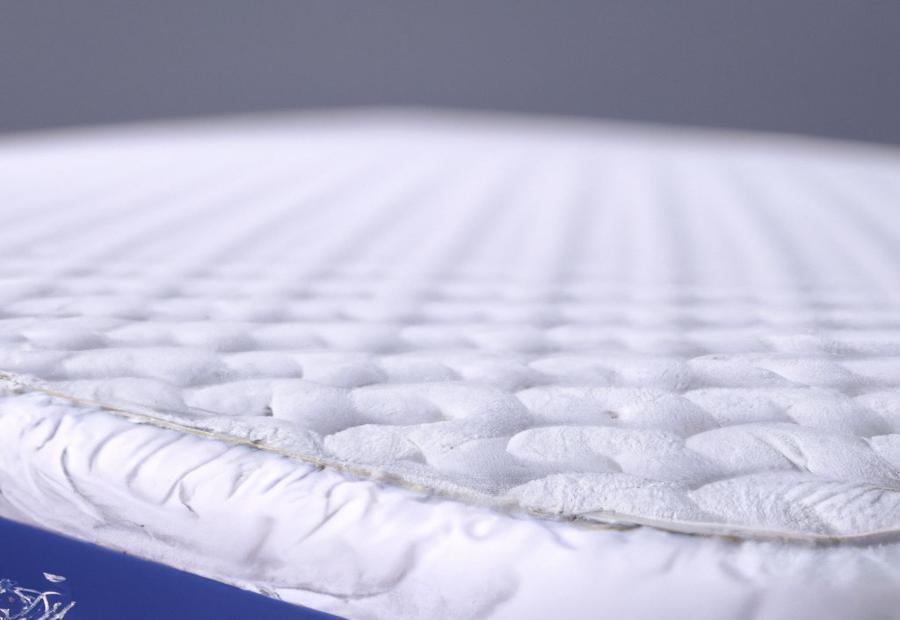
Photo Credits: Www.Mattressreviewguru.Com by Gregory Thompson
When it comes to choosing a king mattress, understanding the importance of a good coil count is key. In this section, we’ll explore what a mattress coil count actually means and why it matters for your sleep quality. Get ready to dive into the world of mattress coils and discover how they can make a difference in ensuring a comfortable and supportive sleep surface for your king-sized slumbers.
Explanation of what a mattress coil count is
A mattress coil count is how many springs are in a mattress. Important to consider when picking a mattress. The higher the count, the better the support and durability. But, the coil count isn’t all that matters. Coil gauge, which is the thickness of the coils, also affects the mattress’s performance.
For a King mattress, it’s like Goldilocks trying to find porridge. Except, not too hot or too cold – it’s about finding the perfect level of support.
Importance of a good coil count for a King mattress
A good coil count is essential for a King mattress. It has an impact on support and comfort. Coil count means the number of coils or springs inside the mattress. Higher count usually means better support and durability. It’s key for a restful sleep on a King mattress.
- Coil count affects support. Higher count makes weight distribution even, reducing pressure points and aiding proper spinal alignment.
- A higher count means better longevity. With more coils sharing body weight, individual coils take less stress, thus reducing wear and tear.
- Motion isolation is another benefit of a higher coil count. More coils absorb movement, lessening disturbances and promoting undisturbed sleep, especially for couples on a King-sized bed.
- A good coil count contributes to better edge support. Quality mattresses with sufficient coils have reinforced edges, stopping sagging or rolling off and maximizing sleeping space.
- Choosing the right coil count allows customization to match comfort levels. It helps cater to individual preferences in terms of firmness.
Getting the right balance between form and function is possible with knowledge of weight distribution, desired firmness levels, and personal preferences. It helps choose the optimal coil count for a King mattress and a comfortable sleep environment. In conclusion: Coil count matters, especially for Kings!
Factors to Consider When Choosing a Coil Count
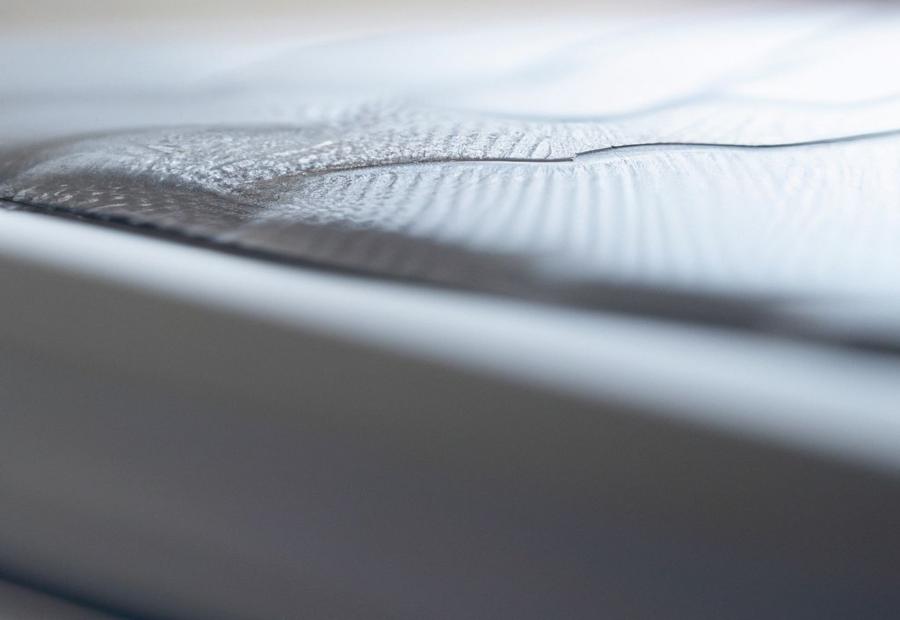
Photo Credits: Www.Mattressreviewguru.Com by Gabriel Ramirez
Choosing the right coil count for your king mattress is crucial for a comfortable and supportive sleep. In this section, we will explore important factors to consider when determining the ideal coil count. We’ll discuss the ideal range for a king mattress, how the weight of the sleeper influences coil count selection, and how the desired level of firmness impacts the decision-making process. So, let’s dive into the key considerations that will help you make an informed choice for a restful night’s sleep.
Ideal coil count range for a King mattress
A correct coil count for a King mattress is key to get the best comfort and support when sleeping. The exact range of coils for a King mattress depends on various things, like the weight of the sleeper and their preferred firmness.
To work out the right coil count for a King mattress, the weight of the sleeper must be taken into account. Different counts are recommended depending on the weight category of the sleeper. For example, someone lighter in weight needs a lower coil count, while heavier people need a higher one for adequate support.
The wanted level of firmness is another factor to think about when deciding on the coil count for a King mattress. People who like a firmer feel should get a higher count. And if a softer surface is preferred, a lower count may be more suitable.
It’s important to remember that more coils are not always better for support. In addition to the coil count, the coil gauge must also be taken into account. Coil gauge is the thickness of the wire used for the coils. All these factors, plus mattress size and personal preference, will help you choose an optimal coil count for a King mattress.
In conclusion, when picking the ideal coil count for a King mattress, it is important to take into consideration the weight of the sleeper and their desired firmness. It is also key to remember that more coils do not always mean better support. Also, understanding the importance of coil gauge is essential. Considering all these factors, people can make sure they pick the perfect King mattress with the right coil count to suit their needs.
How the weight of the sleeper affects coil count selection
The weight of the sleeper is pivotal in choosing the correct coil count for a mattress. This count is the number of coils or springs in the mattress and affects the support and comfort it offers.
- Heavier sleepers usually need a mattress with a higher coil count.
- A greater count helps spread the weight evenly, warding off sagging or sinking in particular areas.
- Heavier folks benefit from a higher coil count as it supports them better and stops the mattress from losing shape.
- Conversely, lighter sleepers may not need as high a coil count since their weight does not put much stress on the mattress.
- Choosing a mattress with the right coil count for one’s weight ensures good spinal alignment and a pleasant sleeping experience.
When assessing how the sleeper’s weight impacts coil count selection, note that some mattresses may have a wide range of recommended counts, while others may have precise guidelines based on weight categories. These guidelines consider factors such as body mass index (BMI) and personal preferences.
Plus, some people may fall in between weight categories or have unique features that necessitate customized advice. In these situations, consulting a reliable mattress expert can provide useful insight into finding the best twin air mattress tailored to individual needs.
As an illustration of how the sleeper’s weight affects coil count selection, let’s look at Mark. He weighs 250 pounds and picks a King-size mattress with a low coil count designed for lighter sleepers. Later, he notices considerable sagging and discomfort due to the inadequate support from the mattress. Seeing his error, Mark decides to purchase a new mattress with a higher coil count suited for his weight group. The new mattress offers him improved support and a better sleep experience. This story emphasizes the importance of considering weight when selecting the right coil count for a mattress.
How the desired level of firmness affects coil count selection
Choosing the right coil count for your mattress is important. It’s the number of coils or springs inside the bed. It affects the feel. A high coil count could mean a softer or medium-firm mattress with more contouring and less motion transfer. If you prefer a firmer feel, go for a lower coil count. That gives you more support and solidness.
But, coil count isn’t the only thing to think about. Coil gauge, padding materials and top layers also influence the feel. All these factors together decide the comfort and support. With knowledge of all these, you can pick the right King-size mattress.
Remember, higher coil counts don’t always make for better support or comfort. You have to find the right balance between coil count, padding materials, and top layers. That’s how you get the best mattress tailored to your needs.
Common Misconceptions about Coil Count
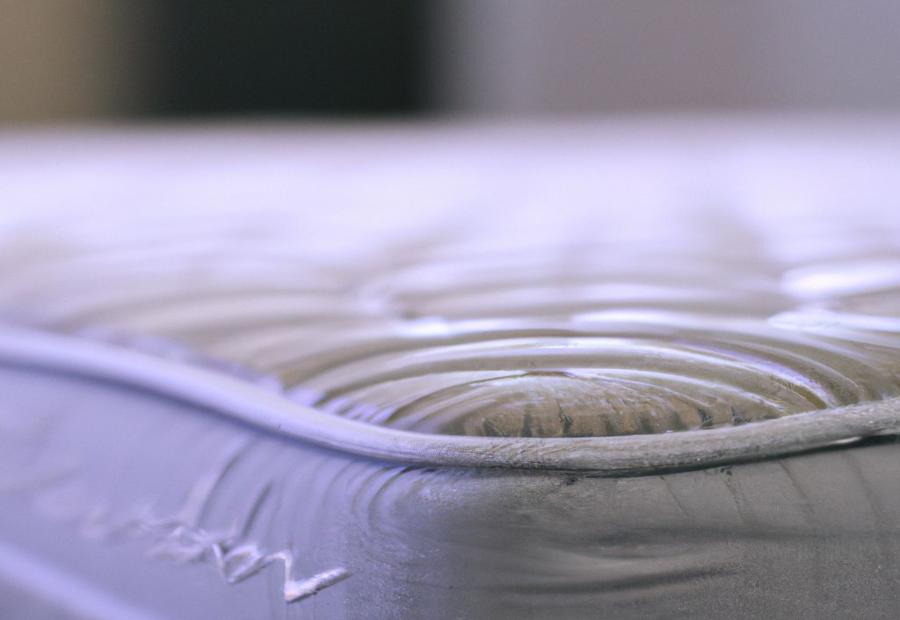
Photo Credits: Www.Mattressreviewguru.Com by Joshua Martinez
The common misconceptions surrounding coil count in mattresses are debunked, revealing that more coils do not always guarantee better support. Additionally, the significance of coil gauge is explained, shedding light on the importance of considering both coil count and gauge for a comfortable and supportive sleep surface.
Debunking the idea that more coils always means better support
More coils don’t always mean better mattress support. Coil count is part of the equation, but it isn’t the only factor. Coil gauge and desired firmness level also come into play. Coil gauge refers to the thickness of the wire used in the coils. A lower gauge means a thicker wire, which usually gives a firmer mattress with more durability.
In addition, personal preference for firmness matters. Someone may want fewer coils for a softer feel, while another person may need more coils for support. Each person’s needs vary based on weight, sleeping position, and individual preferences.
It’s smart to consult an expert or try out different mattresses before buying. A Sleep Foundation study showed mattress support depends on multiple factors, not just coil count.
Explaining the significance of coil gauge in addition to coil count
Coil count and coil gauge are two important factors when selecting a mattress. Coil gauge refers to the thickness of the wire used in the coils. Thicker coil gauges provide more support, while thinner gauges result in softer mattresses.
It’s crucial to choose the right combination with an appropriate coil gauge for the desired firmness and support. Higher coil counts can provide more localized support. But, if the coil gauge is too thin, it won’t guarantee better support.
Finding the right coil count is like Goldilocks trying out all the beds. However, the bears won’t wake up if the coil count is too low or too high. By considering both factors, one can make an informed decision that suits their needs and preferences.
Optimal Coil Count Recommendations
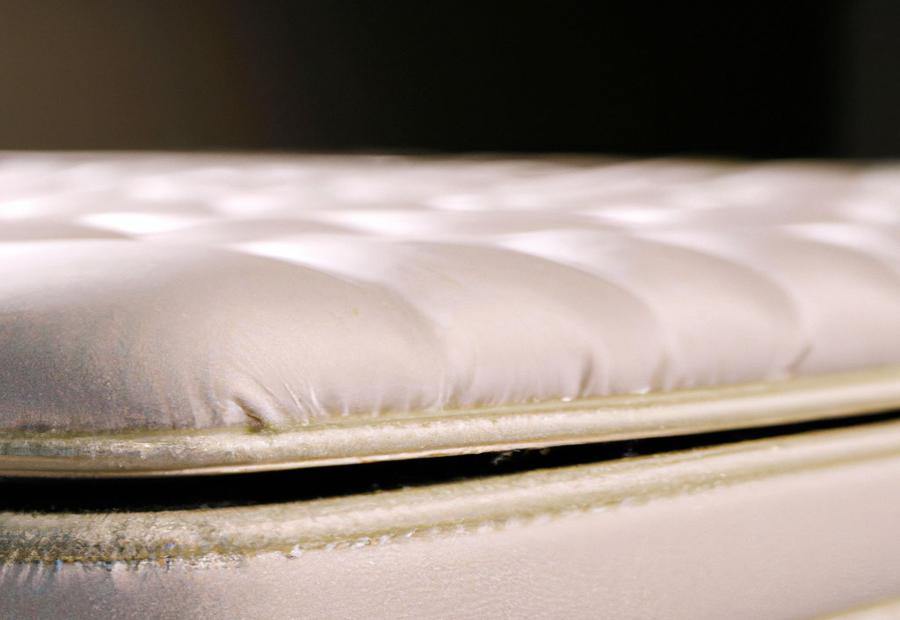
Photo Credits: Www.Mattressreviewguru.Com by Ethan Moore
When it comes to finding the right coil count for a king-size mattress, there are optimal recommendations to consider. In this section, we’ll uncover the recommended minimum coil count for a king-size mattress, as well as the ideal coil count range for different sleeper weight categories. Find out how these coil count recommendations can make a significant difference in the comfort and support of your mattress.
Recommended minimum coil count for a King-size mattress
A good coil count is all about the number of coils in a mattress. It’s key for comfort and support. For a King-size mattress, there needs to be a minimum coil count. This depends on the weight of the sleeper and how firm their mattress should be.
The weight of the sleeper matters when finding the right coil count. Heavier people need more coils. The same goes for firmness – a firmer mattress needs higher coil count.
More coils aren’t always better. Both the quality and gauge of the full size mattress are important too.
So, a King-size mattress should have a minimum coil count tailored to different sleeper weight categories. This helps with support and an enjoyable sleep. Don’t let your weight decide, let your sleep do it!
Ideal coil count range for different sleeper weight categories
Professionally, it’s key to consider an individual’s weight when addressing the ideal coil count range. Coil count impacts the support level, hence choosing right is vital.
To better explain, let’s create a table that categorizes sleeper weight into ranges and provides the corresponding ideal coil count for each category. This will allow individuals to quickly identify their recommended coil count, resulting in optimal comfort and support while sleeping.
| Sleeper Weight Range | Ideal Coil Count |
|---|---|
| Heavyweight | Higher coil count for adequate support all over the mattress |
| Lightweight | Lower coil count for sufficient support without sacrificing comfort |
For example, let’s consider Sarah. She weighs around 200 pounds. Her previous mattress had a lower coil count, which didn’t provide enough support. However, after switching to a King-size mattress with a higher coil count, she experienced improved comfort and better spinal alignment while sleeping.
By understanding the importance of coil count, individuals can pick out the right King-size mattress that suits their specific needs.
Conclusion
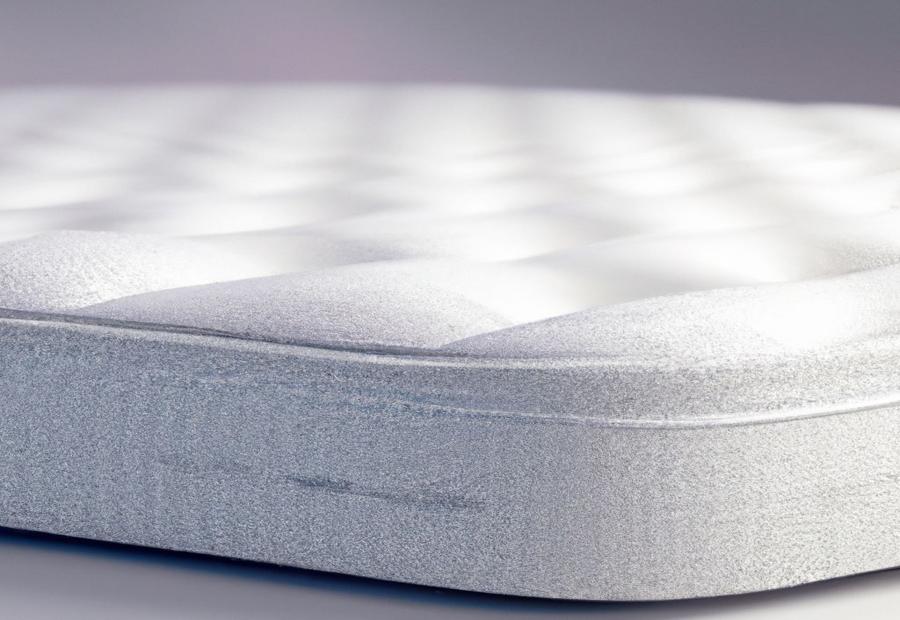
Photo Credits: Www.Mattressreviewguru.Com by Daniel Mitchell
When it comes to choosing the right coil count for a king mattress, the conclusion is clear. In this final section, we will provide a summary of the importance of finding the optimal coil count for your specific needs. We will also discuss some key considerations to keep in mind as you make your final decision. Let’s dive into the conclusion and ensure you end up with a king mattress that offers the perfect balance of comfort and support.
Summary of the importance of choosing the right coil count for a King mattress
Choosing the right coil count for a King mattress is essential. It affects comfort and support. Coil count is the number of coils or springs in the mattress. More coils mean more weight distribution and better spinal alignment. A higher count reduces sagging. Factors like sleeper weight and firmness should be kept in mind when picking the ideal coil count range.
The ideal range for a King mattress is between 1,000 and 2,000 coils. This ensures enough support for two people. Weight of each sleeper is also important. Heavier individuals should opt for higher coil counts to prevent sinking.
Firmness must be considered too. Lower coil count with thicker gauge coils is firmer. Higher coil count with thinner gauge coils is softer. Everyone has different preferences. So, coil count and gauge should be balanced for individual sleep needs.
More coils don’t always mean better support. Plush mattress comfort is equally significant. It’s the thickness or diameter of the wire used in the coils. Thinner wire is softer; thicker wire is firmer.
For King-size mattresses, it’s recommended to have at least 1,000 coils. Depending on weight and preferences, this number may vary. Sleepers weighing less than 200 pounds can go with 1,000 to 1,500 coils. Heavier individuals should opt for 1,500 to 2,000 coils for better support and durability.
Final considerations for selecting the optimal coil count for individual preferences and needs
Careful consideration is needed for selecting the optimal coil count for individual needs. Weight and desired firmness of the sleeper are key factors in determining the ideal coil count for a King mattress. It’s wrong to think more coils always mean better support. Coil gauge also affects mattress performance. Knowing the recommended minimum coil count for a King-size mattress and the ideal coil count range for different sleeper weights is essential. These considerations will help individuals make an informed decision to get the right coil count for their comfort and support.
Some Facts About “What is a Good Coil Count for a King Mattress”:
- ✅ The minimum coil count for a King-size mattress is 450. (Source: Team Research)
- ✅ A good coil count for a King mattress is at least 450. (Source: Team Research)
- ✅ Coil count refers to the number of coils in the mattress, with a higher count indicating better support and durability. (Source: Team Research)
- ✅ For average-weight sleepers, a mattress with around 800 coils is recommended. (Source: Team Research)
- ✅ Heavier individuals may benefit from more than 800 coils in a King-size mattress. (Source: Team Research)
FAQs about What Is A Good Coil Count For A King Mattress
What is a good coil count for a King mattress?
A good coil count for a King mattress is at least 450. The higher the coil count, the better the support and durability of the mattress.
What is coil gauge and how does it affect a King mattress?
Coil gauge refers to the thickness of the coils in a mattress. For a King mattress, a lower gauge number, around 12, indicates firmer and more supportive coils. Higher gauge numbers, up to 15, result in a softer and bouncier feel.
Which type of coil is recommended for a King mattress?
A combination of low and high gauge coils is typically recommended for a King mattress. Low gauge coils provide firm support, while high gauge coils add a softer feel. This combination offers a balanced and comfortable sleeping surface.
What is the ideal mattress coil density for a King mattress?
The ideal mattress coil density for a King mattress depends on individual preferences and body weight. For average-weight sleepers, a mattress with around 800 coils is recommended. However, heavier individuals may benefit from mattresses with more than 800 coils for better support and durability.
What are some recommended innerspring and hybrid beds for a King mattress?
There are several excellent choices for innerspring and hybrid beds in the King mattress category. These options vary in coil count and gauge but are considered to be among the best in terms of support, firmness, and durability.
How does a King mattress with thicker coils compare to one with thinner coils?
A King mattress with thicker coils will generally provide a firmer feeling and stronger support compared to one with thinner coils. Thicker coils have a lower gauge number and offer enhanced durability and stability.

